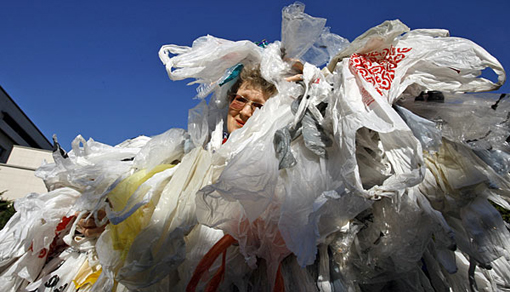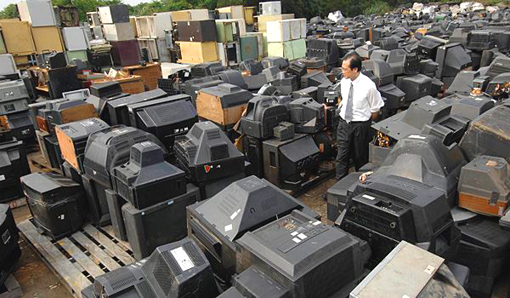You are hereBlogs / WcP.Observer's blog / Los Angeles bans plastic bags; High tech trash: here today, obsolete tomorrow; REFUSE, REUSE to reduce plastic pollution
Los Angeles bans plastic bags; High tech trash: here today, obsolete tomorrow; REFUSE, REUSE to reduce plastic pollution



(quote)
L.A. County passes sweeping ban on plastic bags - "You cannot recycle your way out of the plastic bag problem.. The cost of convenience can no longer be at the expense of the environment."
Enacting one of the nation's most aggressive environmental measures, the Los Angeles County Board of Supervisors voted Tuesday to ban plastic grocery bags in unincorporated areas of the county. The vote was 3-1.
The ban, which will cover nearly 1.1 million residents countywide, is to the point: “No store shall provide to any customer a plastic carryout bag.” An exception would be made for plastic bags that are used to hold fruit, vegetables or raw meat in order to prevent contamination with other grocery items. If grocers choose to offer paper bags, they must sell them for 10 cents each, according to the ordinance. The revenue will be retained by the stores to purchase the paper bags and educate customers about the law.
“Plastic bags are a pollutant. They pollute the urban landscape. They are what we call in our county urban tumbleweed,” Supervisor Zev Yaroslavsky said.
Mark Gold, president of the Santa Monica environmental group Heal the Bay, said previous county efforts to promote recycling of plastic bags at grocery stores was a failure. “You cannot recycle your way out of the plastic bag problem,” Gold said. “The cost of convenience can no longer be at the expense of the environment.”
The action by the Board of Supervisors only covers the unincorporated areas of L.A. County, covering some neighborhoods like Altadena, Valencia and Rowland Heights, but doesn't cover 88 cities in L.A. County. City councils could adopt a similar ordinance.
With the Tuesday vote, L.A. County’s measure is more stringent than similar bans adopted elsewhere in California, Gold said.
San Francisco’s ban, which passed three years ago, is less restrictive because it still permits grocers to offer bioplastic bags made from corn starch, which are imperfect because they also do not degrade in the ocean, Gold said. Bans in San Francisco and Malibu also do not add a surcharge on paper bags, Gold said, which does not give consumers an incentive to switch to reusable cloth bags.
Washington, D.C., decided to tackle the issue not with a ban on any kind of bag, but a 5-cent surcharge per any item of disposable bag.
Gold, however, said an outright ban will be more effective on reducing the 6 billion plastic bags that are used in L.A. County every year, which according to the county, account for 25% of the litter picked up here.
Government figures show that just 5% of plastic bags are recycled.
Here Today, Obsolete Tomorrow
All too often, the hottest devices and coolest gadgets of the moment are dusty in the marketplace before the ink is dry on the receipt. And the pace of replacement is getting faster every year. Indeed, there are so many game-changers in the world of technology that the death knell is sounding on many a device that we use every day.
Recycling is necessary, but it’s not the answer to the plastic pollution problem! REFUSE, Reduce, Reuse, Recycle
As long as we are addicted to single-use disposable products and packaging, we will need recycling systems, just like we need garbage hauling for the waste that can’t be recycled or composted. But where does our plastic “recycling” go after it’s hauled away? Usually, to China, where whole communities are sickened by the toxic emissions from this supposedly green solution.
Recycling is the LAST of the 4 R’s: REFUSE, Reduce, Reuse, Recycle. It’s a last resort when we’ve done the best we can to get disposable plastics out of our lives.
Recycling is necessary. But it’s not the final solution.
(unquote)
Photos courtesy of Gary Friedman / Los Angeles Times, Getty Images, and Reuters



















Plastic bags are really the main contributing factor in drainage systems getting clogged up, causing floods and other harmful effects. I agree that it should be banned in places.
recycling systems is a hard process to us ,wo still have much to do.
Tons of trash composing of unwanted gifts, torn gift wrappers and decors are collected during this time of year and we can do our part by being responsible citizens and recycle. By simply learning how to reuse or recycle paper and plastic products, the amount of waste accumulated in a day will be minimized. What we need to learn and integrate in our daily lives is to properly dispose of our used items.